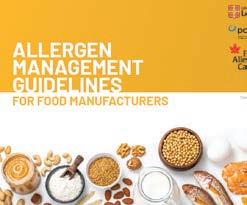
3 minute read
Taking Action to Ensure Safe Food Options for Canadians Living With Food Allergy
Food allergy is a serious public health issue affecting over three million Canadians, including a staggering 600,000 children. Additionally, one in two households nationwide is affected by this condition, making the impact far greater.
For those managing food allergies, accurate ingredient information is the key to identifying safe food options and, consequently, steering clear of a severe allergic reaction. It's not about preference; it's about necessity.
A nationally registered charity committed to educating, supporting, and advocating for the millions of Canadians with food allergies, a key area of focus for Food Allergy Canada is to make it easier to access accurate ingredient information, ensuring the safety and well-being of those with food allergies.
As the only patient organization that supports the food allergy community nationally, the organization’s work proves that information can be a life-saving tool—however, challenges persist. Understanding labels, especially those unclear "may contain" statements, can be perplexing. To add to the confusion, timely notifications regarding product recalls due to mislabelling on pre-packaged products are vital but often fall short. The challenge continues in food service establishments and restaurants, where acquiring ingredient information can be a hurdle.
Food Allergy Canada is not content with merely identifying these hurdles; they're actively engaged in discussions with the government and the food industry to raise awareness and galvanize actions to change the lives of millions.
A recent example of this work is the collaboration the organization led with Maple Leaf Foods, Université Laval and food industry partners to develop a landmark food safety resource—Allergen Management Guidelines for Food Manufacturers—reflecting the industry's best practices.
Supported in part by the Canadian Agricultural Partnership's AgriAssurance Program, this compendium comprises comprehensive guidelines, training modules, and ancillary tools. It's freely available to Canadian Food Manufacturers, empowering them to better manage allergens in their operations. This translates to a potential increase in safe food options, clear and understandable labelling for the affected community, and unwavering support for this consumer base.
Join the movement for safer, more inclusive food practices. Visit foodallergycanada.ca/ AllergenGuidelines to download the free allergen guidelines, training tools and resources!
CELEBRATE THE HOLIDAYS WITH CONFIDENCE: HOSTING WITH FOOD ALLERGIES IN MIND
The holidays are an exciting time of gatherings, whether you are celebrating with family, friends or co-workers. For people managing food allergy, holiday parties also means taking a few extra steps in planning. To help manage the holidays confidently, check out these tips and visit foodallergycanada.ca/holidays for more information, including downloadable resources you can share with others.
TIP 1: ASK, ASK, AND ASK!
• Inquire about specific allergens to avoid: your guests may have multiple allergies, some of which may be uncommon.
• Seek guidance on preparing safe food: share your menu plan and which brands may be best.
• Don't hesitate to ask guests to bring their own safe food!
TIP 2: PREPARE AND SERVE FOOD SAFELY
• Cross-contamination can happen when a food allergen accidentally gets into another food or onto a surface or object.
• To help minimize risks:
• Regular handwashing is crucial.
• Provide individual serving utensils for buffet-style meals.
TIP 3: RECOGNIZE ANAPHYLAXIS AND ITS TREATMENT
• Accidents can happen. Learn to identify signs and symptoms of anaphylaxis, a potentially life-threatening allergic reaction. Visit foodallergycanada. ca/reaction to learn more about the signs and symptoms.
• Treat anaphylaxis with epinephrine auto-injectors like EpiPen® and ALLERJECT®.










